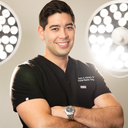We have noticed over time that it has become increasingly difficult for patients to obtain financial reimbursement for upper eyelid surgeries performed to treat "visual field obstruction" from medical insurance companies, be they HMOs, PPOs, or EPOs (exclusive provider organizations). In order to attempt to have an insurance company pay for an upper blephapharoplasty for this indication, most medical insurance carriers will require a visual field test to be performed specifically by an ophthalmologist, and that it demonstrate a significant obstruction of the patient's visual field on upward gaze. Even with such a report, however, there is no guarantee that a patient's medical insurance will pay for this procedure. In fact, in many cases, an insurance company will reserve judgment as to whether it will pay for such a surgery until their own in-house medical review team has reviewed the patient's medical records and operative report AFTER the surgery has already been performed. So, these days, it is all a bit of a crap shoot.In our practice, when we have a patient who wishes to have insurance pay for an upper blepharoplasty for visual field obstruction, we explain to the patient the steps she will have to take to be eligible for the possibility that insurance will pay for this surgery. If additional surgical procedures that could be deemed as being cosmetic in nature are performed at the time of the upper blepharoplasty, the insurance company will generally classify all of the surgeries as cosmetic, and will not pay. This is an important point, because, as plastic surgeons, we generally evaluate the entire periorbital region as a unit. It is sometimes the case that the visual field obstruction caused by dermatochalasis is aggravated by the fact that the patient has concomitant eyelid ptosis, which can be corrected at the same time as the eyelid skin is excised. Alternatively, ptosis of the brow may be aggravating the patient's symptoms, and this can be corrected by an endoscopic brow lift performed at the same time. Our practice's policy is therefore to evaluate each patient thoroughly and systematically based on our determination of which procedure or combination of procedures would most benefit the patient, regardless of what an insurance company may or may not say. We have our patients pay their surgical fees in advance of the surgery, after patient and surgeon have come to an agreement about what procedure, or combination of procedures, will be performed. We tell our patients that we will help them with any forms or documentation that the insurance company requests. We make sure that each patient understands that most insurance companies will make the determination of whether they will pay for such a procedure only AFTER the surgery has been performed. If an insurance company does provide reimbursement for such a surgery, these days it will often send the check directly to the patient. In the event that the insurance company sends the reimbursement check to our practice, we will forward it to the patient to cash. We have found this protocol to be the cleanest and most ethical manner in which to treat patients in the current climate of increased scrutiny of claims by medical insurance companies.













